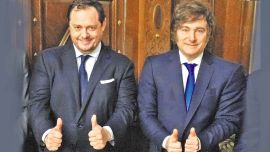Days after official data confirmed that inflation hit a 20-year high last month and with rumours of a government reshuffle growing stronger, Economy Minister Martín Guzmán will fly to the United States on Sunday for the Spring Meetings of the International Monetary Fund and World Bank.
The meetings will be the first time the minister has met with IMF staff since Argentina signed an agreement to restructure its US$44.5-billion debt with the multilateral lender and while Guzmán’s agenda is not yet confirmed, it is expected that he will sit down with officials to discuss the state of play ahead of the deal’s first quarterly review, which is due to take place in May.
Guzmán, 39, flies to Washington on the back of a week of turmoil for the ruling Frente de Todos coalition. Rumours of an imminent reshuffle have dominated the past week’s headlines, topped only by Wednesday’s bombshell news that inflation rose 6.7 percent in March from the previous month – the highest jump since the 2002 crisis.
Reports of tensions within Frente de Todos were also stoked by a fiery speech from Vice-President Cristina Fernández de Kirchner, who seemed to indirectly criticise President Alberto Fernández for not “doing what needs to be done.”
Guzmán’s Washington trip will be closely watched both at home and abroad. He is expected to face tough questions from the IMF, especially after a senior economist at the Fund criticised runaway price hikes.
Speaking to Bloomberg Television, IMF Strategy Director Ceyla Pazarbasioglusaid that "inflation is paralysing the economy" in Argentina and "needs to be tamed".
To compensate for the negative price trends, which accumulated a rise of 16.1 percent in the first quarter of this year, Guzmán will be able to show that he is doing some of the homework given to him by the IMF agreement, such as hiking interest rates.
On Wednesday, the day the INDEC national statistics bureau revealed the inflation data, Argentina’s Central Bank increased the interest rate for Leliq (Letras de Liquidez) bonds to 47 percent for an effective annual yield of 58.7 percent. In her interview, Pazarbasioglu recognised that this interest hike responded to the requisites specified in the agreement.
Further action in line with IMF requests is increasing public service billing to reduce subsidies and facilitate the goal of cutting the fiscal deficit.
Guzmán will also be able to show that he has started work on that aspect. Despite the reticence of the government’s Kirchnerite sectors to make this unpopular move, the minister has called the public hearings for increasing gas and electricity bills for next month as from May 10. There will be no increase for the beneficiaries of the social billing for gas this year while their electricity counterparts in the Buenos Aires Metropolitan Area (AMBA) will be hiked six percent.
“Most residential clients of Edenor and Edesur excluded from this benefit will be subject to an average increase of 17 percent while most gas consumers nationwide will see a 21.5 percent rise with slight variations according to region,” according to the government’s plans.
Additional policies should also be up for debate, including those Argentina may have to adjust before the debt deal’s first review in May.
The IMF board recently admitted that the international context, a product of Russia’s invasion of Ukraine, will likely impel recalibration of the agreement with the March inflation figure accelerating these adjustments.
The agenda of the IMF-World Bank Spring Assembly Bank will include climate change, the persistence of the pandemic and the global economic effects of the war in Ukraine.
Inflation fears confirmed
Fears over runaway price hikes were confirmed on Wednesday when INDEC confirmed that prices jumped 6.7 percent in March. The figures means that prices have risen by 55.1 percent over the last 12 months and by more than 16 percent in just the first quarter of the year.
March’s price hikes, which were exacerbated by an international rise in food and energy prices as a result of Russia's invasion of Ukraine, were led by a 23.6 percent rise in education that coincided with the start of the school year.
Clothing was up 10 percent, while housing, water, electricity, gas and other fuels rose 7.7 percent. Despite government-imposed price controls, food and non-alcoholic beverages were up 7.2 percent. Core inflation, which ignores regulated and seasonal prices, reached 6.4 percent.
Argentina has long struggled with an inflation rate that ranks among the highest in the world and the March data casts a further shadow over the Alberto Fernández administration's grip on the economy.
Even if the indications are that this month’s inflation will weigh in at between 4.3 and 5.5 percent, economists and experts are already warning about new increases and more uncertainty.
Economist Hernán Letcher expects prepaid healthcare schemes to be increased six percent, accumulating 12 percent so far this year, along with possible increases for medicaments. Cable television and Internet are in line for an official increase of 10 to 13 percent while City Hall has authorised a nine percent increase in school fees with no confirmation as yet from Buenos Aires Province.
“April should result in a smaller percentage than March but you have to put an asterisk for the dynamics of recent months being disassociated from the evolution of costs because it is difficult determining a balance for inflation on the basis of the devaluation of the costs,” Letcher said on Friday.
Prices rose by 3.9 percent in January and by 4.7 percent in February, meaning the government’s projected annual target of between 38 and 48 percent – outlined in the original IMF deal – now seriously in doubt.
The Central Bank’s most recent monthly market expectations survey forecast a rate of 59.2 percent this calendar year, with some private estimates now predicting that inflation could surpass 60 percent.
Speaking on Tuesday, prior to the release of official data, Guzmán called for united “political support” to tamp down price hikes.
“Inflation is attacked with macroeconomic policy and two things are needed here: an economic programme, which we already have, and political support,” he told the C5N news channel.

























Comments